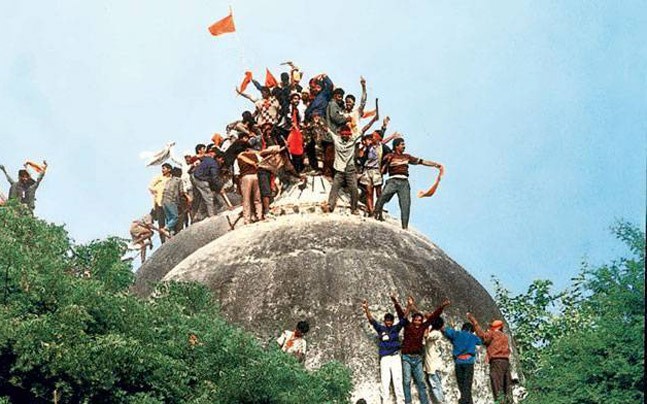The decades of the 1980s were a turning point in the history of the country. For the first time, an emotive issue like Ram Temple took the better of social issues related to economic and social justice. On the heels of the opening of the locks of Babri Mosque, Advani of BJP planned his Rath Yatra and in the aftermath of V.P. Singh’s implementation of Mandal Commission report, the Yatra was intensified. The Yatra was the first major polarizing event in the history of the country and it left a trail of violence in its aftermath. The demolition of Babri Mosque and the consequent increase of the electoral power of BJP are too well known. BJP which had made the pretence of having the agenda of ‘Gandhian Socialism’, had bitten the dust at electoral level. Rath yatra came as a rejuvenating elixir for this party, whose electoral strength saw the steep rise to power with forming a minority Government in 1996, forming alliance Governments NDA from 1998 and then getting the full majority on its own in 2014 general elections.

The formula of success for BJP has been well internalized by the party; divisive emotive issues, return of Lord Ram in election seasons, supplementing other identity issues like Holy cow, Vande matram, Love jihad etc.; have formed the powerful armamentarium of this party. As we are to face the general elections in a year to come, Lord Ram is being brought back to the social-political scene yet again.
This time around, RSS chief Mohan Bhagawat set the ball rolling with his prodding in Udupi Dharma Sanasad of VHP in November 2017. The cue was taken up by VHP and under the aegis of VHP and Muslim Rashtriya Manch, and yatra started from Ayodhya in UP to Rameshwaram in Tamilnadu. The organization convening the whole exercise is Shri Ramdas Mission Universal Society from Maharashtra. It is having the Rath shaped in the pattern of the proposed temple at Ayodhya. The yatra’s agenda is politically clear; its major aims reveals yet again as to what do these followers of Hindu nationalism aim at. Their demands include establishing Ram Rajya, a grand temple at Ayodhya, to include Ramayana in school syllabus and to shift the weekly holiday of Sunday to Thursday etc.
Many a Muslim majority countries are having weekly off on Friday, on those lines, the demand has been put forward to have it on Thursday. What is to be seen primarily is that India is currently connected with offices worldwide, business offices will have better functioning in keeping with global norms. As far as introducing Ramayana in school syllabus is concerned RSS VHP again seems to have a narrow view. One recalls that ABVP, the student wing of RSS had created ruckus against the seminal essay on Lord Ram by A K Ramanujan, Three Hundred Ramayana’s… and got it deleted from the syllabus. This essay tells us that there are many versions of Lord Ram story. The telling of these diverse Ramayana’s is at variance with each other. For example Ram story, ‘Ramkin’ prevalent in Thailand, has Lord Hanuman, not as a celibate but a family man. The Ramayana prevalent in parts of Andhra has a version which is from the angle of women. Again Valmiki Ramayana and Tulsidas Ramayana also have some nuanced difference. RSS combine has a single version to uphold. So which Ramayana will be introduced?
As such the issues raised by this combine have no relevance to the needs of Hindus, despite the claims that RSS is for Hindus. What will social and economic goals be achieved by the Ram Temple or Ram Rath yatra? Will it solve the issues of Hindu farmers or Hindu jobless youth? Will this enhance the health and nutritional status of Hindu women and children? Will it address the issues of Dalits who are facing caste atrocities or will it any way help the women, incidents of violence against whom are rising by the day?
The yatra is being taken out at a time when Supreme Court is in the process of hearing the case related to land dispute where the Babri mosque was located. What signal does this Yatra give regarding the upholding the decisions of the Courts? The Hindu nationalists are diverting the social attention and resources in directions which relate purely to emotive aspects of dominant sections of society. Yogi Adityanath in his budget has given provisions for Ram Idol in Ayodhya, allotted money for celebrating Divali and Holi. A state where children have died due to lack of Oxygen cylinders such a budget is an insult to the concept of social welfare. Such Yatras are purely having political goals. If Gandhi’s Ram is asked what will he prefer to have at the site where Mosque was demolished, surely his answer would be to have a public utility like a Hospital or a University, and not his temple!

